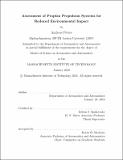| dc.contributor.advisor | Zoltán S. Spakovszky. | en_US |
| dc.contributor.author | Peters, Andreas, Ph. D. Massachusetts Institute of Technology | en_US |
| dc.contributor.other | Massachusetts Institute of Technology. Dept. of Aeronautics and Astronautics. | en_US |
| dc.date.accessioned | 2010-09-01T16:26:44Z | |
| dc.date.available | 2010-09-01T16:26:44Z | |
| dc.date.copyright | 2010 | en_US |
| dc.date.issued | 2010 | en_US |
| dc.identifier.uri | http://hdl.handle.net/1721.1/58080 | |
| dc.description | Thesis (S.M.)--Massachusetts Institute of Technology, Dept. of Aeronautics and Astronautics, 2010. | en_US |
| dc.description | Cataloged from PDF version of thesis. | en_US |
| dc.description | Includes bibliographical references (p. 135-138). | en_US |
| dc.description.abstract | Current aircraft engine designs tend towards higher bypass ratio, low-speed fan designs for improved fuel burn, reduced emissions and noise. Alternative propulsion concepts include counter-rotating propfans (CRPs) which have been investigated intensively in the 1970s and 1980s and demonstrated significant reductions in fuel burn. Currently, propfans are being studied again due to their inherent noise challenge and the potential for reduced environmental impact. A newly developed, integrated noise and performance assessment methodology for advanced propfan powered aircraft configurations is introduced. The approach is based on first principles and combines a coupled aircraft and propulsion system performance analysis with 3-D unsteady, full-wheel CRP CFD computations and aero-acoustic simulations. Special emphasis is put on computing CRP interaction tones. The method is capable of dealing with parametric studies and exploring noise reduction technologies. An aircraft performance and mission analysis was first conducted on a candidate CRP powered configuration. In addition, a comparable aircraft with advanced turbofan engines was defined for performance and noise comparisons. | en_US |
| dc.description.abstract | (cont.) Guided by data available in the literature, a detailed aerodynamic design of a pusher CRP was carried out using vortex-lattice methods and 3-D steady RANS computations of the counter-rotating stage. Full-wheel unsteady 3-D RANS simulations were then used to determine the time varying blade surface pressures and unsteady flow features necessary to define the acoustic source terms. A frequency domain approach based on Goldstein's formulation of the acoustic analogy for moving media and Hanson's single rotor noise method was extended to counter-rotating configurations. The far field noise predictions were compared to experimental data and demonstrated good agreement between the computed and measured interaction tones. The underlying noise source mechanisms due to front-rotor wake interaction, aft-rotor upstream influence, hub-endwall secondary flows and front-rotor tip vortices were dissected and quantified. Based on this investigation, the CRP was re-designed for reduced noise incorporating a clipped rear-rotor and an increased rotor-rotor spacing to reduce upstream influence, tip vortex, and wake interaction effects. Maintaining the thrust and propulsive efficiency at takeoff conditions, the noise was calculated for both designs. At the interaction tone frequencies, the re-designed CRP exhibited an average reduction of 7.25 dB in mean SPL computed over the forward and aft polar angle arcs. On the engine/aircraft system level, the re-designed CRP demonstrated a reduction of 9.2 EPNdB and 8.6 EPNdB at the FAR 36 flyover and sideline observer locations, respectively. The results suggest that advanced open rotor designs can possibly meet Stage 4 noise requirements. | en_US |
| dc.description.statementofresponsibility | by Andreas Peters. | en_US |
| dc.format.extent | 138 p. | en_US |
| dc.language.iso | eng | en_US |
| dc.publisher | Massachusetts Institute of Technology | en_US |
| dc.rights | M.I.T. theses are protected by
copyright. They may be viewed from this source for any purpose, but
reproduction or distribution in any format is prohibited without written
permission. See provided URL for inquiries about permission. | en_US |
| dc.rights.uri | http://dspace.mit.edu/handle/1721.1/7582 | en_US |
| dc.subject | Aeronautics and Astronautics. | en_US |
| dc.title | Assessment of propfan propulsion systems for reduced environmental impact | en_US |
| dc.type | Thesis | en_US |
| dc.description.degree | S.M. | en_US |
| dc.contributor.department | Massachusetts Institute of Technology. Department of Aeronautics and Astronautics | |
| dc.identifier.oclc | 639280401 | en_US |
